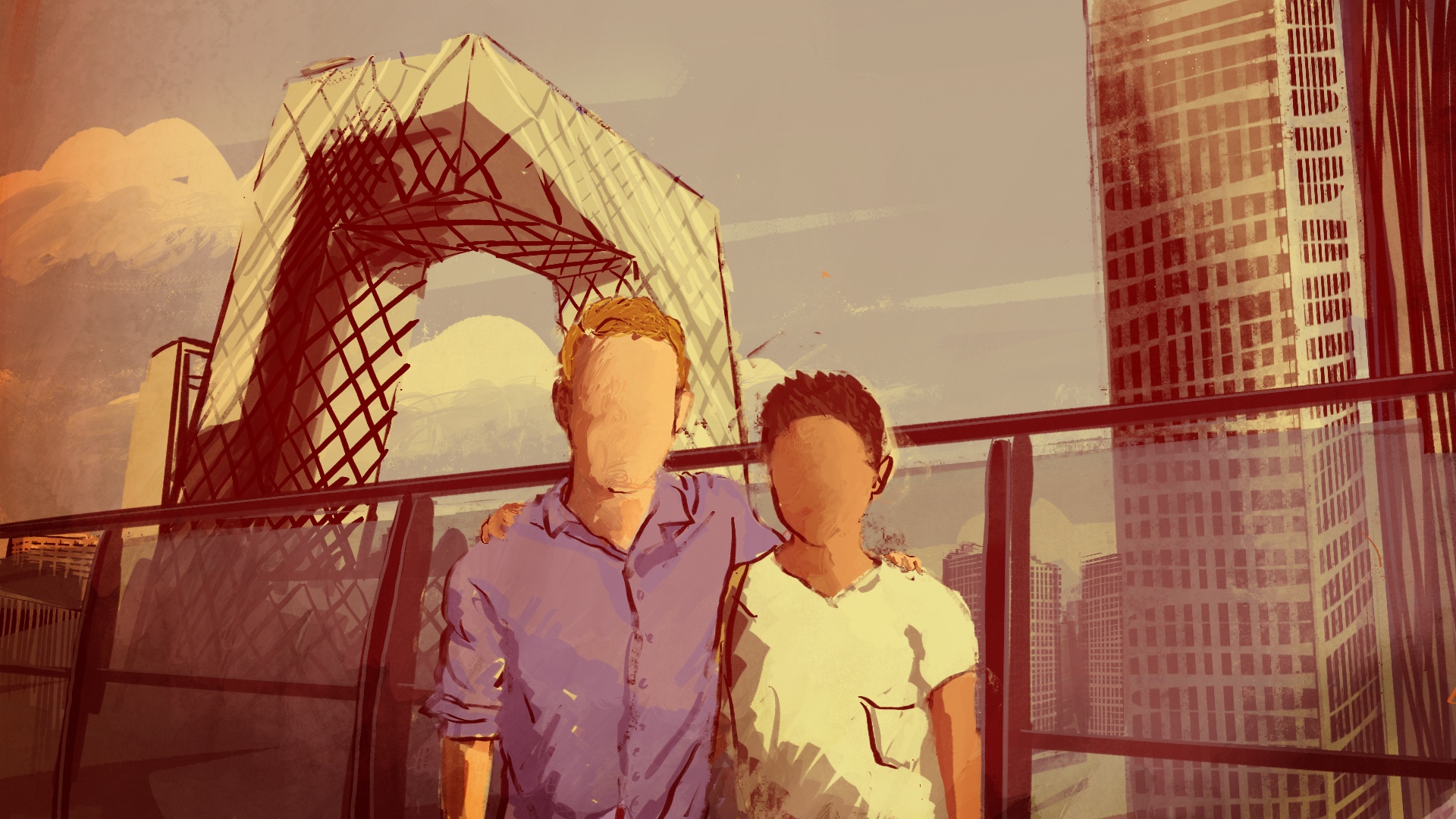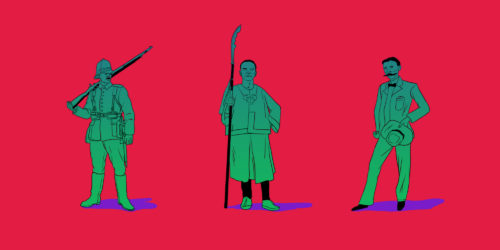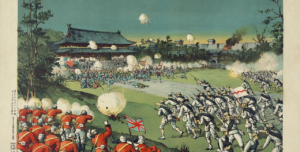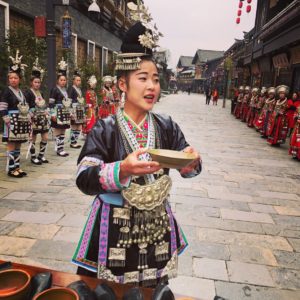
I was ghosted by my closest friend in China. What did I learn?

My first year in Beijing, I lived on the third floor of a gray building just outside the city’s Second Ring Road, a brisk five-minute walk from the Fuchengmen subway station, named for a gate in the old city wall. I passed the tomb of Mateo Ricci, a 16th-century Jesuit missionary, when I walked to the subway. The Soviet-style Exhibition Center, constructed in 1954, towered over the intersection near my home.
Of course, I knew none of the history then. I was 22, recently graduated from college, clueless about many things, including but not limited to the Chinese language, Chinese history, and most Chinese culture beyond kung fu and Peking duck. I had moved to China more or less on a lark, wanting something different from my life than the predictable security of Boston or New York. I taught English at China Foreign Affairs University, a prestigious training school associated with the Chinese Foreign Ministry.
In those first few weeks, when I wasn’t teaching, I wandered the boulevards around my apartment looking for coffee shops to service my caffeine addiction. I couldn’t read or speak Chinese, which meant that I couldn’t differentiate between a convenience store and a massage parlor. But coffee shop design, I discovered, has a transnational aesthetic: plants, books, glass, exposed brick, wood, skylights. I found one near my apartment with good lighting and a small indoor fountain but a habit of playing the same one-hour English-language playlist, on repeat, every day. I drank coffee there as I contemplated the smog that pressed in from all sides, seeping in through the shop’s open door. The air tasted like metal.
One day, on my walk home from that coffee shop, along the gray streets and gray trees of Convention Center Road, I discovered a one-dollar egg-pancake stall. In front of this stall, beneath one of those pinwheel umbrellas you typically see at the beach, I noticed a man in a business suit walk past me, nudge his partner, nod his head in my direction, and say — “Laowai.”
I typed the sounds into my dictionary app: l-a-o-w-a-i. Translation: “foreigner.” Sounds about right, I thought to myself. Foreigner is what I am.

I first met Lim two years later, at Peking University, where he and I were classmates studying at the Yenching Academy, a newly opened graduate program in Beijing. The majority of the Yenching Academy’s students were new college graduates, and I, having lived two years in Beijing by this point, reckoned myself to be an old hand. I could speak some Chinese, had traveled across China, had read Chinese books, knew slightly more about the culture than kung fu and Peking duck, though nowhere near as much as I thought I did.
Lim and I lived in a five-story dormitory called Shaoyuan, where the university authorities placed many of its foreign students in gilded confinement. Lim and I each had our own room. In the morning, the sun streamed through gray haze into a spacious studio apartment. Across the courtyard, I watched Chinese peers brush their teeth, comb their hair, squeezed four-to-a-room in exchange for the honor of a Peking University education. Our rooms featured plants, placed by the window, watered by the dormitory cleaning staff, who were low-paid migrant workers from the villages outside Beijing. We lived well.
Lim was Chinese-Malaysian, with a long scrawny torso swaddled loosely in New York-style hipster flannel. He wore his hair long, bundled into a ponytail, and rarely spoke to classmates, except to conduct the American-style pleasantries that prevailed in the dormitory hallways. Lim’s most defining feature was his lazy eye, result of a childhood injury, which had the disarming tendency to gaze slightly above you, as if to soften his gaze. In the panicked friend-making of the program’s early months, Lim and I seldom had occasion to speak to each other. I thought of him as taciturn, even brooding. I didn’t think of him much.
Lim and I shared one thing, however — close friendships with a charismatic young Singaporean student, Jamie, who gradually through the force of her personality brought Lim and myself into repeated contact with each other. In these meetings, I learned more about Lim’s background: his itinerant upbringing, relocating from Malaysia to America to China, alongside his deep commitment to racial justice, social justice, and critical scholarship. I learned he graduated from Columbia University with a degree in anthropology. I learned that at Peking University he studied homoeroticism in early 20th-century Chinese fiction. I learned about his boyfriend, Josh, a white blonde minister’s son from Ohio.
Accidentally, then more intentionally, Lim and I became friends. After graduating from Peking University, Lim and I saw each other regularly, often for dinner, usually at a chic new Japanese restaurant near Ghost Street, the city’s ancient night market. The two of us sat across from each other, surrounded by dim lights and wooden tabletops and the bustle of the restaurant’s mostly hip clientele, while our faces grew rosy from cups of sake.
Typically at these dinners, Lim would complain about something. His co-worker drank too much at company parties; his students texted him too often; the bread in Beijing wasn’t fresh enough, except for at Baker & Spice, where it was too expensive. After each complaint Lim would wave his hand theatrically or roll his eyes unevenly, shaking his head in disappointment. Then he dismissed his own concern, repeating that it wasn’t a big deal, really. I nodded sympathetically, not feeling the compulsion to dispute him, even when I disagreed. I figured he just needed to vent. We ordered more sake.
During lulls in the conversation, Lim and I sometimes paused to eavesdrop on the conversations happening around us. In my early days of learning Chinese, I wanted so desperately to understand the words I overheard in restaurants or on the subway. Now I could, and for the most part, felt underwhelmed by what I learned:
“She said what to you?”
“And so I said to him, there’s no way I’m going to allow that to happen.”
“The food here is not quite as good as…”
In other words, I had learned, Chinese people were like Americans, were like me, were humans like anybody else, but were speaking Chinese. This realization, which occurred to me only after several years in the country, felt simultaneously banal and profound. I rarely allowed myself to say it aloud for fear of revealing how benighted I previously had been. And yet, I cherished the realization as the foundation of my own personal belief system, my strongest guarantee against being that wrong kind of expat, the expat Lim might complain about, the one who generalized about Chinese people but dated Chinese women and complained about the smog.
And so as we listened, the two of us, to the conversations of the customers around us, I would sometimes feel a heartwarming sensation of together-ness, both with Lim and the restaurant’s other patrons. At base we were all the same, I felt, in those moments. I felt like I belonged.
I treasured those dinners in part because they were not, on the whole, representative of my time in Beijing. In my experience, being a white foreigner in Beijing is both easy and hard. It is easy because many Chinese people treat foreigners as welcome guests. They are kind and respectful and try to make us feel comfortable. It is hard for the same reason. A guest, by definition, belongs somewhere else. In Mandarin, the polite way to say “foreigner” is waiguoren. The wai means “outside” and by extension has taken on the word “foreign,” and has a sharp falling tone, like the scolding of a dog. It is not uncommon for a Chinese person to point at a foreigner on the street, as happened to me, and say, “foreigner,” as if observing an exotic mammal. It does not feel nice to be pointed at, and sometimes it makes me uncomfortable. But also I know the pointing isn’t malicious, and in fact, I understand why people do it, given foreigners’ relative scarcity and obvious different-ness. I myself have done the same, when traveling away from Beijing. It is human nature to notice people who look different than you, I think.
For a white American in China, though, who previously had no experience being part of a minority group, the experience of being different — of being pointed at, talked about, and generally noticed — means acquainting one’s self with a persistent feeling of unearned low-grade celebrity, which, if I am to admit in the quiet of the night, is not as unpleasant as I might hope it to be. Being noticed is distressing and flattering at the same time, and even if you wished it would disappear, it won’t. And maybe in your darkest heart you are glad it won’t. I once remarked to a Chinese friend that I wanted sometimes to blend in, in China. “If you did,” she replied, “would you still like it here?” The answer scares me.
Foreign-born Chinese, like Lim, are both waiguoren and zhongguoren (“Chinese person”). They are neither here nor there, or if you like, both here and there. Lim was born in Malaysia to Chinese parents. Lim’s first language was Hakka, a Chinese ethnic minority language, but his most comfortable tongue was English, and he spoke Mandarin with an accent. Lim’s situation was particularly thorny, I imagine. As a gay person in Malaysia, where homosexuality is criminalized, perhaps he couldn’t quite belong; as an Asian American in the U.S., where he grew up, he might not belong either. Against this backdrop he began his studies in anthropology, where he researched identity movements in Southeast Asia. Lim didn’t just study politics. He lived it.
For that reason, I was always careful when we discussed whiteness, China, or Chinese-ness. Both of us had studied Mandarin and gotten degrees from Peking University. Both of us read widely about Chinese history. We were both, in some sense, foreigners to China. Yet I was white and he was Chinese, and this fact interpolated all of our interactions. I knew that he possessed a variety of experience I could not access. I knew that Chinese-ness was personal for him in a way it was not for me. And so, without ever consciously making the decision to do so, I often deferred to him when we discussed things about China. To me, this deference felt natural, obvious, intuitive; after all, he was Chinese.

Over Chinese New Year, our Singaporean friend invited Lim, Josh, and I to attend her wedding in Singapore, to be held at an upscale hotel, with peripheral events at a private girl’s school, a nearby bar, and ultimately the Thai beach town of Phuket, where the wedding’s out-of-town guests would gather for three days in a mountainside Airbnb. Lim and Josh decided to make a month-long trip out of the excursion, including stopovers in Kuala Lumpur, where Lim had childhood friends, and Penang, where Lim’s parents maintained a home overlooking the Straits of Malacca. Lim invited me to join. By this point Lim had become perhaps my closest friend in the city. I accepted.
After the wedding, Lim, Josh, and I shared a room in the rented Airbnb — Lim and Josh slept together in a queen bed while I slept beside them in a twin. During the day we swam in the pool, walked the stalls in the beachside bazaars and ate Thai food in streetside cafes, whose proprietors, in addition to speaking English, were accustomed enough to tourists to provide large laminated picture menus. In the evenings we retired early. Brushing our teeth before bed one night, with the city lights illuminating the skyline beyond the window, I told Lim that he and Josh were an adorable couple, that I was grateful to spend time with them, that I was happy as I could remember being. Lim made a sarcastic comment, perhaps out of embarrassment. Josh smiled ear-to-ear.
Later, in Lim’s family home in Malaysia, Josh and I lay by the seaside, where Josh confessed, looking at the ocean beyond his feet, that for the first time in his life, he could imagine himself marrying someone, marrying Lim, making Malaysia his second home. I told him they would make a fine couple.
At the end of the week, I was scheduled to fly to San Francisco, where I had a graduate school interview. I hugged Lim by the elevator in his apartment, thanked him for hosting me, reiterated how grateful I was for his friendship. I stepped into the elevator, waving.
It was the last time I ever saw him.

Because we had spent so much time together, I didn’t write Lim over the next few weeks, even after both of us returned to Beijing. He might need alone time, I figured. When I did send a text, the first since our goodbye in Penang, he didn’t respond.
Perhaps he hadn’t seen the message. I sent another two days later. Lim replied that his phone was acting up. No problem! I said, Hope you’re okay! One week later, I wrote again. Did he want to get dinner next week?
After a day of silence, a sickly feeling gathered in my stomach. Lim always responded to texts. Our dinners had been so regular as to scarcely require confirmation. I didn’t know why Lim was not responding, and that worried me. I called Josh.
Josh picked up after two rings, and said, with obvious sheepishness in his voice, that he didn’t want to get in the middle of it. Middle of what? I asked. The question hung limply in the air.
“Lim is being silly. He says he doesn’t want to talk to you anymore,” Josh told me. “I told him he’s being ridiculous but he won’t listen. You know how he gets.”
Why? What happened? I asked. What is going on?
“He says you have differences of opinion and he doesn’t want to talk to you anymore. I — ugh.” His discomfort was evident. What differences of opinion? I asked. What are you talking about?
“Do you remember the van ride from the airport in Thailand?” Josh asked me. “You were sitting on the left, talking to some of Jamie’s friends who were sitting in front of you.”
The van ride had occurred halfway through our trip, after the wedding. The memory of the van ride blurred into view, but I didn’t remember anything special about it. I remembered I had spoken to the bride’s guests — mostly white. Few of them had visited Asia before. None had visited China. I remembered talking about China.
“Well, he heard you say things about China, he said, that weren’t okay. That no friend of his should be saying. And he can’t be friends with you anymore. I told him that the things you said weren’t unusual, that I had heard you say that kind of thing before, but I guess he just hadn’t heard you say them.”
I wracked my memory. I tried to remember what I said. I couldn’t remember what I said. What did I say? I asked Josh.
“Nothing! Seriously — I don’t think you said anything unusual. Lim asked Maggie and Ken. They agree with me.”
Maggie and Ken were our mutual friends. Lim had been talking about me behind my back.
I pressed for more details, but Josh couldn’t, or wouldn’t, provide any. I hung up the phone. I knew then, knew with the intuition honed from a hundred dinners, that Lim and I were through.
Standing in my apartment in Yonghegong, staring out the window at the cornices of the Lama Temple, looking at the mint plant on the windowsill, the mint plant that Lim had once helped water for me, I searched my memories for the van ride, for the words I might have said, for the opinions I might have expressed. Again I came up blank.
When my roommate returned home, I mumbled that something horrible had happened, then, when met with the faint flicker of concern in his expression, dissolved into an unintelligible profusion of tears. My roommate got angry on my behalf, told me that Lim was unreasonable to do this. I wanted to believe him, in fact did believe him, but could not muster any anger in self-defense. I knew myself, knew how I secretly enjoyed my celebrity, enjoyed the attention lavished upon foreigners. I knew the beliefs I had once held — how Chinese people are all this or all that; that Chinese people were somehow different from Americans; I knew those thoughts still lived in me, resurfaced sometimes, if ever I relaxed my vigilance. Try though I might to dispel them, one’s tribal instincts are not so easily ousted.
Possessed by a guilty conscience, I wanted to apologize to Lim, but I didn’t know what to apologize for; I didn’t know what I had said. In the darkness of my imagination, the litany of possible transgressions grew more and more repulsive, more and more damning. All the bad things that comprise me. All the racist thoughts I might have had. In my imaginings, I had expressed all of them. Lim was right to cut me off. I was a monster.
On my right ear, a small hoop marked the afternoon when Lim and I had gotten piercings together. My WeChat profile picture had been a picture of us. I felt petty taking it down, but I felt stupid leaving it. I took it down.
Over the following months, I watched as spring bloomed on the trees outside my window. The sun hung higher and longer over the temple’s yellow roofs. Tourists thronged the monastery’s wooden gate. Along the canal where I went running each morning, bronzed older men fished with bamboo rods.
I loved Beijing. But I could sense in the manifold and smaller interactions — my eye-roll at a street hawker accosting me, my irritation at a store-owner practicing his English with me — that it was time to leave. I was becoming that wrong kind of expat.
On one of my final days in the city, I climbed the highest hill in Jingshan Park, south of the Drum Tower, where tourists and locals gather to watch the sunset over the western mountains. Each evening, sunbeams glint off the skyscrapers in the city’s Financial District, then bask the Forbidden City in a warm red glow.
It feels like gentle senescence, like the twilight of an age. That evening, as most evenings, tourists crammed themselves into the southwest corner of the highest pavilion in the park, craning their selfie sticks for the perfect angle on the magic.
At the park’s exit, I hailed a tuk-tuk, a three-wheeled electric car that buzzes between traffic and through alleyways. Seated in its backseat, head bumping against the thick mottled plastic covering the door, my thoughts returned to Lim. I sent him a final text. It read: “Hey bud. I leave next week. Wanna get lunch Sunday and put all this behind us before the end?”
He didn’t reply.

I returned to the United States, a country I scarcely recognized. Billie Eilish. Anthony Scaramucci. Love Island. Donald Trump. Outside my childhood home, cardinals chirped and squirrels eyed me suspiciously. On morning walks I passed two-car garages, political posters, rainbow LGBT flags. “My” world. The place I was supposed to belong.
One afternoon, possessed by a desire to cook Chinese food, I drove my parents’ car to the Asian grocer, in a shopping center originally founded by South Vietnamese refugees. I strolled past aisles of bok choy and pork dumplings and Sichuan hotpot sauce, chatted with an employee selling egg tarts. I turned over ginger root in my hands.
I felt ridiculous, a white guy bobbing his head to Sino-pop music and sniffing packets of tea. I felt self-conscious, like I was pretending at an affinity I didn’t deserve. And yet — I felt comfortable, too.
Being ghosted by Lim had hardened me. I was more fearful now about expressing political opinions. I cried when a Chinese-American friend accused me of being a “parachute journalist” in China. (She later apologized.) I avoided conversations about race or politics. I even, I’m ashamed to admit, made fewer friends of color, worried about how I might offend them, imagining how our friendships might rupture.
I’ve started to heal now. The wounds aren’t so raw. Before writing this essay, I decided to write Lim once again. I needed to know what I had said that day. I needed to know what I did wrong.
This time — nearly two years later — he responded.
“On our trip,” his letter read, “I began to realize the degree to which our politics were incompatible – at least that was my perception.” He cited an instance where he said I defended American moral leadership — which, he said, he “fundamentally disagrees with.”
“I was also a bit surprised,” he continued, “at what I perceived to be your suggestion that being a white journalist in China is difficult — that somehow there was an almost conspiratorial effort to deceive, trick, and mock white journalists.” It felt tone deaf, he said, for a white cisgender male who speaks Chinese to feel that he wasn’t treated well enough in China. Especially, he went on, when he, Lim — a foreign-born gay Malaysian-Chinese person with a non-standard accent — struggled with acceptance himself. My grievance, compared to his, felt like a “slap in the face.”
And then he apologized. Even with those incompatibilities, he said, he shouldn’t have ghosted me. “I fully understand that it was super fucked up,” he wrote. “I’ve been thinking about reaching out ever since the beginning of the pandemic when I’ve had time to think of the fucked up shit I’ve done and how if I died tomorrow I wouldn’t want to leave things unresolved. I hope all is well with you and your family, and I really do wish the best for you.”
Those were the sum total of my transgressions: an expression of support for American moral leadership and a recounting of the complexities of being a white person in China. (To this day, I don’t remember what I said about American moral leadership. I feel equivocal about it now; I assume I felt equivocal about it then.)
The note itself was ambivalent. It expressed regret for how he treated me, but not quite regret for ending our friendship; it expressed confidence that our politics were incompatible, but not quite outright certainty (“at least that was my perception”). Perhaps he himself didn’t know how he felt.
Lim did leave one final clue. “I also have a tendency,” he wrote, “to cut out people close to me when they or I am about to leave, mostly because it’s just easier to move on. It’s not a healthy mindset, but it’s one I’ve grown accustomed to from all the times I’ve had to move.” In other words: avoid the problem, not solve it.
It’s a familiar struggle. In China, especially, some tasks are enormous. How to reconcile rising prosperity with deepening repression; to love a country even as one critiques it; how to navigate identity — foreign, black, gay, or anything else — in a homogenous populace with scarce vocabulary for those who don’t belong.
The writer Zadie Smith once described “Dream City,” where “the idea of a unified singular self is an illusion,” a place of “collective human messiness.” People in Dream City are multivocal; they carry multiplicities inside them. They have no choice but to “cross borders and speak in tongues”: Mandarin in Beijing, English in the U.S., hakka on the streets of Malaysia. As a result of their intersecting loyalties they are viewed suspiciously wherever they go.
I believe that Lim hails from Dream City. After five years in China, I may have glimpsed it, too. To that legion of conflicted souls, committed to the United States and China, Dream City may await all of us. Where “foreigner” isn’t an insult, neither a falsehood, but rather an impossibility. In that place, Lim and I might be friends again. Not despite our differences, but because of them.
Names have been changed in this essay.





